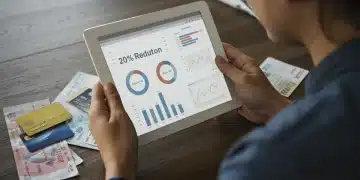Debt consolidation strategies to regain financial freedom

Debt consolidation strategies involve combining multiple debts into one payment plan, simplifying financial management and potentially lowering interest rates, which can lead to better control over your finances.
Debt consolidation strategies can be a game changer for many people struggling with multiple payments. Have you ever felt overwhelmed by various bills? Let’s dive into effective ways to simplify your financial situation.
Understanding debt consolidation
Understanding debt consolidation involves grasping the concept of merging multiple debts into a single payment. This process can help reduce stress and simplify your financial management. By focusing on one monthly payment, you can regain control over your finances and work towards paying off your debts more effectively.
What is Debt Consolidation?
Debt consolidation refers to the method of combining several debts into a single loan or payment plan. This can often lead to lower interest rates and smaller monthly payments, which is beneficial for many borrowers.
- Streamlined payments
- Potentially lower interest rates
- Improved credit score over time
Another popular avenue for debt consolidation is through a personal loan. This allows you to take out a loan for a specified amount and use it to pay off your existing debts. The remaining balance will be paid off in installments, simplifying your debt situation.
Benefits of Understanding Debt Consolidation
Knowing how debt consolidation works is crucial for anyone looking to improve their financial health. It also helps you understand the different options available, such as secured or unsecured loans. Taking advantage of these options can significantly ease financial burdens.
- Clarifying your financial commitments
- Reducing the number of creditors you deal with
- Offering the possibility of lower monthly payments
Understanding the cause of your debts is equally important. By identifying whether they stem from overspending, unexpected expenses, or other factors, you can better approach your consolidation strategy. Make sure to explore all available options while seeking assistance from financial advisors when needed.
Ultimately, understanding debt consolidation is an essential step toward achieving financial freedom. The knowledge you gain will empower you to make informed decisions and take proactive steps in managing your debts effectively.
Benefits of consolidating your debts
The benefits of consolidating your debts can significantly improve your financial landscape. By combining multiple debts into a single payment, you can simplify your budget and gain greater control over your finances. This approach not only reduces the hassle of managing various payments but can also lower your overall interest rates.
Simplified Payments
One major advantage of debt consolidation is having just one monthly payment instead of several. This makes budgeting easier and helps ensure that you don’t miss payments. When you’re juggling multiple debts, it can be easy to forget about one, leading to late fees and a negative impact on your credit score.
- Reduced stress from fewer payments
- Less chance of missing deadlines
- Streamlined financial management
In addition to simplifying payments, it can also lead to lower interest rates. Many consolidation loans offer fixed rates that might be lower than what you’re currently paying on credit cards or other loans. This decrease in interest can save you money in the long run, allowing you to pay off your debt faster.
Improved Credit Score
Another important benefit is the potential for an improved credit score. When you consolidate your debts and make regular payments, your credit utilization ratio improves. This shows that you are managing your debts responsibly, which can positively influence your credit profile.
- Lower credit utilization ratio
- Positive payment history
- Better credit opportunities in the future
Furthermore, consolidating debts may provide you with a fresh start. By wiping the slate clean, you can approach your finances with a new mindset, focusing on creating healthy saving habits. It’s essential, however, to avoid running up new debts while consolidating existing ones. Gaining control over your financial habits is key to ensuring lasting improvement.
Types of debt consolidation methods

Understanding the types of debt consolidation methods can help you make informed decisions about managing your debt. There are several options available, each with its unique advantages and potential drawbacks. By exploring these methods, you can find the best fit for your financial situation.
Debt Consolidation Loans
A popular option is taking out a debt consolidation loan. This loan allows you to borrow a larger amount to pay off multiple smaller debts. You will then have a single monthly payment, which may be at a lower interest rate. This method is often straightforward and can simplify your financial life.
- Fixed monthly payments
- Lower interest rates
- Simplified budgeting
Another option is a personal loan specifically designed for debt consolidation. This might require good credit, but it can offer terms that are more favorable than credit card payments, making it easier to manage.
Balance Transfer Credit Cards
Balance transfer credit cards offer another useful strategy for consolidating debt. With this method, you move your existing credit card balances to a new card with a lower or even 0% introductory interest rate. This can provide significant savings if you plan to pay off the balance during the low-interest period.
- Opportunity for interest-free payments
- Potential for rewards or benefits
- Streamlined payments
However, it’s essential to read the fine print, as high rates often kick in after the introductory period ends, and there could be fees involved.
Home Equity Loans and Lines of Credit
If you own a home, you might consider a home equity loan or a home equity line of credit (HELOC) as a method for debt consolidation. These options allow you to borrow against the equity you have built in your home. The interest rates are usually lower than those of unsecured loans. However, this method puts your home at risk if you fail to repay.
- Lower interest rates
- Large borrowing amounts
- Tax-deductible interest in some cases
Each method has its pros and cons, so it’s crucial to assess your financial situation and choose the one that aligns with your goals. Whether you prioritize lower interest rates, simplified payments, or flexibility, knowing the types of debt consolidation methods can help you find a solution that fits your needs.
Steps to consolidate your debts
Consolidating your debts can seem overwhelming, but understanding the steps to consolidate your debts can make the process much easier. The first step is assessing your current financial situation. This means listing all your outstanding debts, their amounts, and interest rates. Knowing what you owe is crucial in deciding how to proceed.
Research Your Options
Next, it’s important to research the various debt consolidation options available to you. This includes loans, balance transfer credit cards, and home equity lines of credit. Each method has different requirements, so look into which might be the best fit for your financial situation.
- Consider your credit score
- Compare interest rates
- Evaluate fees for each option
After identifying the options that suit you, the next step is to apply for the chosen method. This typically involves filling out an application and providing documentation about your income and debts. Be sure to read the terms carefully before proceeding.
Create a Repayment Plan
Once approved, you will need to create a repayment plan. This is where you decide how much you can afford to pay each month toward your consolidated debt. Make sure your payments fit into your overall budget, so you don’t end up in the same situation again. It’s important to stick to this plan and make consistent payments.
- Set a monthly budget
- Automate payments if possible
- Track your progress regularly
As you begin to make payments, keep track of your progress. Seeing how your debt decreases can motivate you to continue. If you encounter difficulties, don’t hesitate to reassess your plan and make adjustments as needed. Remember that consolidating your debt is a step toward improving your financial health, and staying committed to the process is key.
Common pitfalls to avoid during consolidation
When consolidating your debts, it’s crucial to be aware of the common pitfalls to avoid during consolidation. Many individuals make mistakes that can hinder their progress toward financial freedom. Understanding these pitfalls can help you navigate the process with greater success.
Taking on More Debt
A major mistake people make is accumulating new debt after consolidation. Once you consolidate your debts, it’s essential to resist the temptation to use credit cards or take on new loans. This can lead to a cycle of debt that is hard to escape. Instead, focus on sticking to your budget and maintaining a clear understanding of your financial limits.
- Delay rewarding yourself
- Avoid using credit cards impulsively
- Plan needs before wants
Another common pitfall is not reading the terms of the consolidation loan. Many people get caught in unfavorable agreements due to a lack of understanding. Always pay attention to the details, including interest rates, fees, and any potential penalties for late payments.
Failing to Create a Budget
Without a solid financial plan, you may struggle to keep up with your payments post-consolidation. It is important to create a budget that outlines your income and expenses. This plan should prioritize your debt payments while also allowing for everyday expenses. If you neglect to budget, you could find yourself back in debt quickly.
- Track your expenses regularly
- Adjust your budget monthly
- Set aside funds for emergencies
Staying consistent with your payments is also vital. Missing payments can lead to increased interest rates and fees, negating the benefits of consolidation. Automating your payments can be a helpful strategy to avoid this trap.
Ignoring Financial Education
Finally, another mistake is failing to educate yourself about personal finance. Understanding financial concepts can empower you to make better decisions moving forward. Take the time to read materials, attend workshops, or even seek advice from financial experts. The more knowledge you gain, the better equipped you are to handle your finances and avoid pitfalls in the future.
FAQ – Common Questions about Debt Consolidation
What is debt consolidation?
Debt consolidation is the process of combining multiple debts into a single loan or payment plan, typically with the goal of reducing interest rates and simplifying payments.
What are the benefits of consolidating my debts?
Some benefits include simplified payments, potentially lower interest rates, and improved credit scores over time with consistent payments.
What pitfalls should I avoid during debt consolidation?
Avoid taking on new debt, not reading the loan terms thoroughly, failing to create a budget, and ignoring the importance of financial education.
How do I start the debt consolidation process?
Begin by assessing your current debts, researching consolidation options, applying for a suitable method, and creating a repayment plan that fits your budget.





